How Service Changed My Life: Points of Light Staff Share Their Service Stories
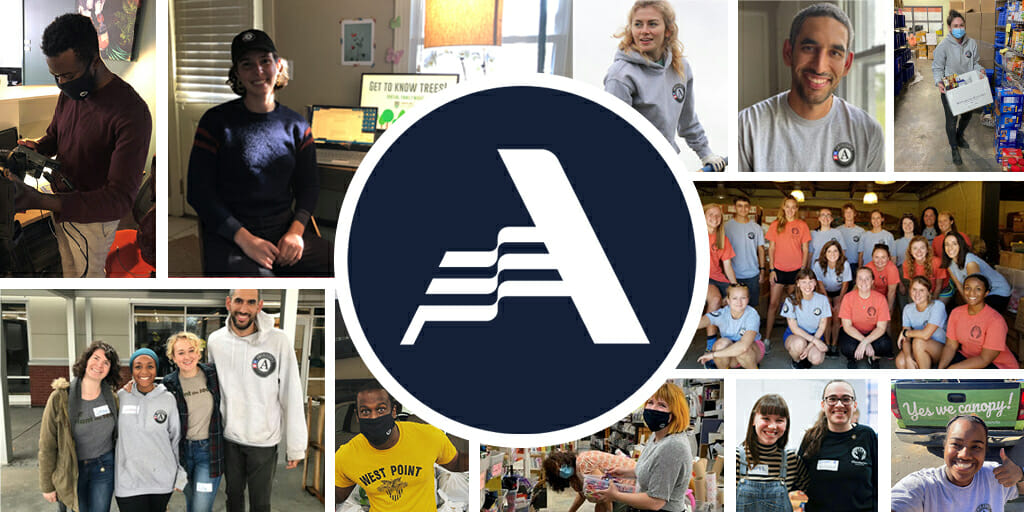
Service is impactful not just to recipients and community members, but can also be deeply impactful to those who serve. While there are many forms of service, national service is an opportunity to travel, understand systemic challenges others face and improve others quality of life.
Additionally, research shows that service can help individuals build new skills for their future. For instance, 86% of participants in Youth Corps said they had gained “skills for getting a better job/career,” 83% said their service helped them explore “future job/education interests” and 91% thought their service would “look good on [their] résumé.”
While there are many types of service opportunities out there, those interested in national service might consider looking into two organizations that have a multitude of opportunities.
AmeriCorps is a U.S.-based organization that mobilizes 270,000 individuals annually to serve communities across America. Volunteers participate for anywhere from three to 12 months, and are usually focused on service areas such as disaster relief, education, environmental issues and helping veterans and military families.
The Peace Corps is an international organization with volunteers in over 60 countries. Those who enroll in the Peace Corps dedicate at least two years to service and are placed based on their interest areas and skills.
Points of Light Staff and Service
Many of Points of Light’s staff have had experience in national service, and our organization is better because of their experiences!. The knowledge and skills acquired in AmeriCorps and Peace Corps positions often equip them for a career in the nonprofit sector. Here are a few of our phenomenal staff members who shared their experiences with service prior to joining the Points of Light team.
Maya Cross, coordinator, Capacity Building
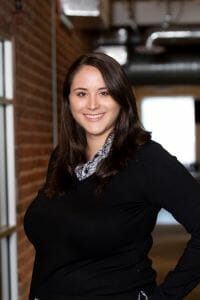 I served in the Peace Corps in Colombia from 2016 to 2019. I began as an English Education Facilitator, then served an additional year as a Peace Corps Volunteer Leader. I worked in partnership with four local English teachers to incorporate social advocacy and technology skills into the English curriculum. I also worked with a community partner to develop a project called “Talleres por la Paz,” or “Workshops for Peace.” We united the two local schools, local government and a Colombian and U.S. nonprofit around the goal of hosting a day camp for youth. The camp was led by student teachers and focused on engaging youth in experiential education activities to build skills of empathy, teamwork and conflict resolution. Finally, in my third year as a Peace Corps Volunteer Leader, I supported Peace Corps Trainees and Volunteers through training and coaching.
I served in the Peace Corps in Colombia from 2016 to 2019. I began as an English Education Facilitator, then served an additional year as a Peace Corps Volunteer Leader. I worked in partnership with four local English teachers to incorporate social advocacy and technology skills into the English curriculum. I also worked with a community partner to develop a project called “Talleres por la Paz,” or “Workshops for Peace.” We united the two local schools, local government and a Colombian and U.S. nonprofit around the goal of hosting a day camp for youth. The camp was led by student teachers and focused on engaging youth in experiential education activities to build skills of empathy, teamwork and conflict resolution. Finally, in my third year as a Peace Corps Volunteer Leader, I supported Peace Corps Trainees and Volunteers through training and coaching.
I was always aware of the Peace Corps because my dad served in Costa Rica in the 1970s. The stories that I heard growing up about the people he met and how much he learned during his time as a volunteer ultimately inspired me to join. During my time serving, I learned that the world needs fewer saviors and more collaborators. The community you are working with will always be the expert in what is best and as a Peace Corps Volunteer it is your job to follow their lead. My time in the Peace Corps taught me that humans around the world have more in common than what separates us. As citizens of the world, the health of our planet is interconnected. The solutions to dealing with the issues we face as a planet can only be created by recognizing our mutuality, combining our strengths and collaborating with each other.
Toby Chalberg, senior vice president, Digital Strategy and Business Development
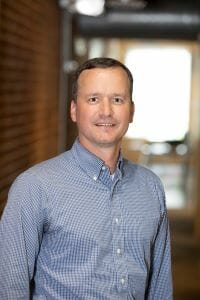 I served with AmeriCorps-City Year in San Antonio, Texas and AmeriCorps*NCCC in Washington, D.C. By design, AmeriCorps*NCCC teams deploy on a variety of short-term projects ranging from two to eight weeks over the course of the service year. Our team’s first assignment was a disaster relief project in response to Hurricane Floyd in North Carolina where we supported FEMA and Red Cross Shelter Operations for displaced families. Later on in the year we had the opportunity to return to those same communities to help with the recovery phase, including a door-to-door canvassing project that revealed strikingly low registration rates for federal and state assistance that resulted in the Governor extending the deadline for families to apply. The year ended with an assignment to staff a summer programming operation at a Boys and Girls Club in Parkersburg, WV where we planned daily enrichment and service activities for the area kids.
I served with AmeriCorps-City Year in San Antonio, Texas and AmeriCorps*NCCC in Washington, D.C. By design, AmeriCorps*NCCC teams deploy on a variety of short-term projects ranging from two to eight weeks over the course of the service year. Our team’s first assignment was a disaster relief project in response to Hurricane Floyd in North Carolina where we supported FEMA and Red Cross Shelter Operations for displaced families. Later on in the year we had the opportunity to return to those same communities to help with the recovery phase, including a door-to-door canvassing project that revealed strikingly low registration rates for federal and state assistance that resulted in the Governor extending the deadline for families to apply. The year ended with an assignment to staff a summer programming operation at a Boys and Girls Club in Parkersburg, WV where we planned daily enrichment and service activities for the area kids.
I had discovered the transformative power of immersive service experiences while in college and wanted to continue that exploration. One piece of advice I heard during those times was to “make yourself vulnerable to the experience”. In the programs I served with in particular, teams were made up of all young people, ages 18-25. We were all learning, making mistakes, trying to figure out our relationship to the world and to each other. It could be easy to avoid grappling with those questions, and messy in attempting to do so, but when I did expose my honest ignorance, or risk asking questions, or admit a mistake, it often led to personal insights and different dimensions of personal relationships I have since been able to apply to the rest of my life. Since then, I’ve taken on many related projects, from running national AmeriCorps programs to advocating for expansion of AmeriCorps in Congress to promoting digital solutions that can mobilize people at scale. I firmly believe that, with rare exceptions, a year of national service is an important opportunity to consider for every young person.
Sandrine Uwera, manager, Corporate Solutions
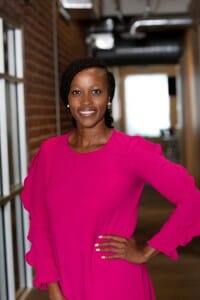 I served with AmeriCorps. My first year was spent in Douglasville, Georgia, and my second year in Washington, D.C. During my first year I served at a residential treatment program for children and youth with serious emotional and behavioral challenges. Our work ranged from tutoring the students to hosting after school programs to helping to build an outdoor kitchen. My second year I served at a nonprofit that works with homeless teens, where I managed their volunteer program.
I served with AmeriCorps. My first year was spent in Douglasville, Georgia, and my second year in Washington, D.C. During my first year I served at a residential treatment program for children and youth with serious emotional and behavioral challenges. Our work ranged from tutoring the students to hosting after school programs to helping to build an outdoor kitchen. My second year I served at a nonprofit that works with homeless teens, where I managed their volunteer program.
When my family moved to the U.S., we were helped by so many selfless volunteers and nonprofits. I served with AmeriCorps because I wanted to pay their kindness forward. I truly believe in the power of service. It really does change your outlook on life, while also giving you a lot of real life and work experience. I learned to adapt to challenging situations. I learned a lot about not judging people, instead looking past what I saw on case files. From project management to public speaking to conflict resolution and, most importantly, how to work with a team, all the skills that I learned during my service I use in my job every day.
Lauren Reynolds, director, Capacity Building
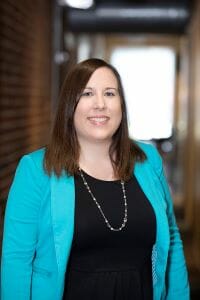 I served with AmeriCorps from 2005 to 2006. My program was based at the Metro Atlanta Task Force for the Homeless and had members placed at sites in Atlanta, Augusta and Macon, Georgia. My primary role was working with unhoused women to search for jobs, prepare for interviews, write resumes and cover letters, apply online, etc. Because many of the women we worked with lacked technology skills or didn’t know how to search online for jobs, this became a barrier to trying to find a job. I realized I needed a low-tech solution to make the process feel accessible. I started assessing the types of jobs they were looking for and created binders by job type that I updated daily as I found new job listings – and would work with them individually to apply based on the support they requested. Those moments when they came in the office and said “I got the job” meant everything.
I served with AmeriCorps from 2005 to 2006. My program was based at the Metro Atlanta Task Force for the Homeless and had members placed at sites in Atlanta, Augusta and Macon, Georgia. My primary role was working with unhoused women to search for jobs, prepare for interviews, write resumes and cover letters, apply online, etc. Because many of the women we worked with lacked technology skills or didn’t know how to search online for jobs, this became a barrier to trying to find a job. I realized I needed a low-tech solution to make the process feel accessible. I started assessing the types of jobs they were looking for and created binders by job type that I updated daily as I found new job listings – and would work with them individually to apply based on the support they requested. Those moments when they came in the office and said “I got the job” meant everything.
My AmeriCorps term started shortly after Hurricane Katrina hit the gulf coast. Atlanta was second to Houston in receiving evacuees. It wasn’t long after they arrived in Atlanta that the emergency shelters started closing and the evacuees wound up in the shelter system that was already over capacity. It created a crisis in the city and I participated in a number of working groups of the city’s organizations to figure out how to address this influx in the request for services and develop opportunities to help them resettle. My understanding of poverty issues in the U.S. was limited to what I saw in the news and surface-level volunteer experiences. It didn’t go very deep on explaining the systems at play contributing to these issues. I didn’t have a clue, and I thought a program like AmeriCorps could be a meaningful way to support a cause I cared about and educate myself at the same time. AmeriCorps gave me the focus I needed and 15 years later, I’m doing the work that I do today because of that experience.
To learn more about service and dedicating your time to these organizations, visit AmeriCorps or Peace Corps.
